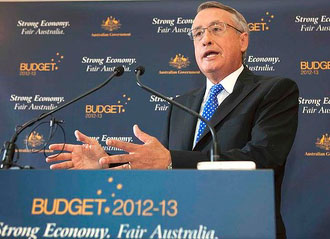|
News - May 18, 2012
"The small business sector is largely ignored by Canberra"
|
What The Budget Means For Small Business
SMH - My Small Business May 15, 2012
(Max Newnham)
This year's federal budget has again shown that the small business sector is largely ignored by politicians and bureaucrats in Canberra. One of the budget measures will only help those businesses that can afford to purchase assets, while the other will tend to only help large and medium-sized businesses.
.jpg)
The main small business tax initiative in the budget was in fact not a new measure but an old one updated. From July 1, 2012 small business entities, those with a turnover of less than $2 million, can claim an immediate tax deduction for assets purchased costing less than $6500. When this measure was originally announced the limit was $5000.
Where an asset costs $6500 or more it can be depreciated in a single group or pool...
Read more: http://www.smh.com.au/small-business/finance/what-the-budget-means-for-small-business-20120514-1ym1s.html#ixzz1vBzp8YaV
|
The View From The Lunchroom
Here are the juicy bits, in a nutshell:
"Small" business is still defined by an annual turnover of less than $2M p.a. (No change since 2007, despite CPI increases). CPI would see it at about $2.25M, by now.
Asset purchases up to $6,500 are immediately deductible (Up from $5,000). Everything over $6,500 and with a useful life of fewer than 25 years remains at 15% depreciation in the first year and 30% p.a. therefater, except buildings (Still 5% per annum).
An immediate tax deduction up to $5,000 can also be claimed in the first year, for the purchase of a motor vehicle.
So, in practical terms, there has been a slight benefit for small business, in terms of front-loading depreciation, assuming they are profitable, and paying tax.
The other significant move was to allow a company to claim a tax refund if it makes a loss in a financial year, and if company tax was paid on a profit made up to two years ago.
OK, that's it! Back to work!
(As always, the information in this column is not financial or accounting advice. Such advice should be sought from your qualified accountant or financial adviser, specific to your circumstances.)
|
News - May 11, 2012
"What happened in the budget?"
|
Federal Budget: The Devil is in the Detail
SMH - Business Day May 12, 2012
(Ross Gittins)
If you take the figures at face value, this week's budget is deeply contractionary, delivering a blow to demand at a time when parts of the economy aren't at all strong. But in economics, it's rarely wise to take things at face value.

There are different ways to assess the ''stance'' of fiscal policy - to work out the direction and size of the effect a budget will have on the economy. Settle back.
There's a two-way relationship between the budget and the economy. The decisions announced in the budget have an effect on the economy but, at the same time, the economy has an effect on the budget.
The budget contains elements - such as the progressive tax system and the availability of the dole to people without jobs - that have the effect of helping to stabilise the economy as it moves through the business cycle. Read More
|
The View From The Lunchroom
That's why they earn the big bucks?
The lunchroom discussion this week was about the effect of the Australian federal budget.
The unseemly rush to bring the budget back to surplus in 2013 is a core election promise made by Gillard and Swan, a while back.
Seems like a good idea, right? Let's take a look at it a little more closely, for the effect it will have on business.
In short, the government has shifted the tax rebates and refunds for "schoolkids bonus", "carbon tax compensation", "Qld disaster relief", "infrastructure spending" and "local government grants" ... a total of $8.8Billion, back into the 2011-12 fiscal year.
That might ease some of the pain retail is feeling.
The hope, it seems, is that and a few other budget measures might put further downward pressure on the RBA Cash Rate and maybe push the dollar a little lower against other currencies, which will also be a boon to exporters.
The fly in the ointment may be the faltering Euro, which may attract a flight of capital to places including Australia, which could be perceived to be a "safe haven" for a large slice of global liquidity.
That could trigger a sharp rise in the AUD against the US dollar, bringing it up to as much as USD$1.70 by 2014, according to UK hedge fund economist, Dr Savvas Savouri.
Aren't you glad you're not responsible for running the show?
(As always, the information in this column is not financial or accounting advice. Such advice should be sought from your qualified accountant or financial adviser, specific to your circumstances.)
|
